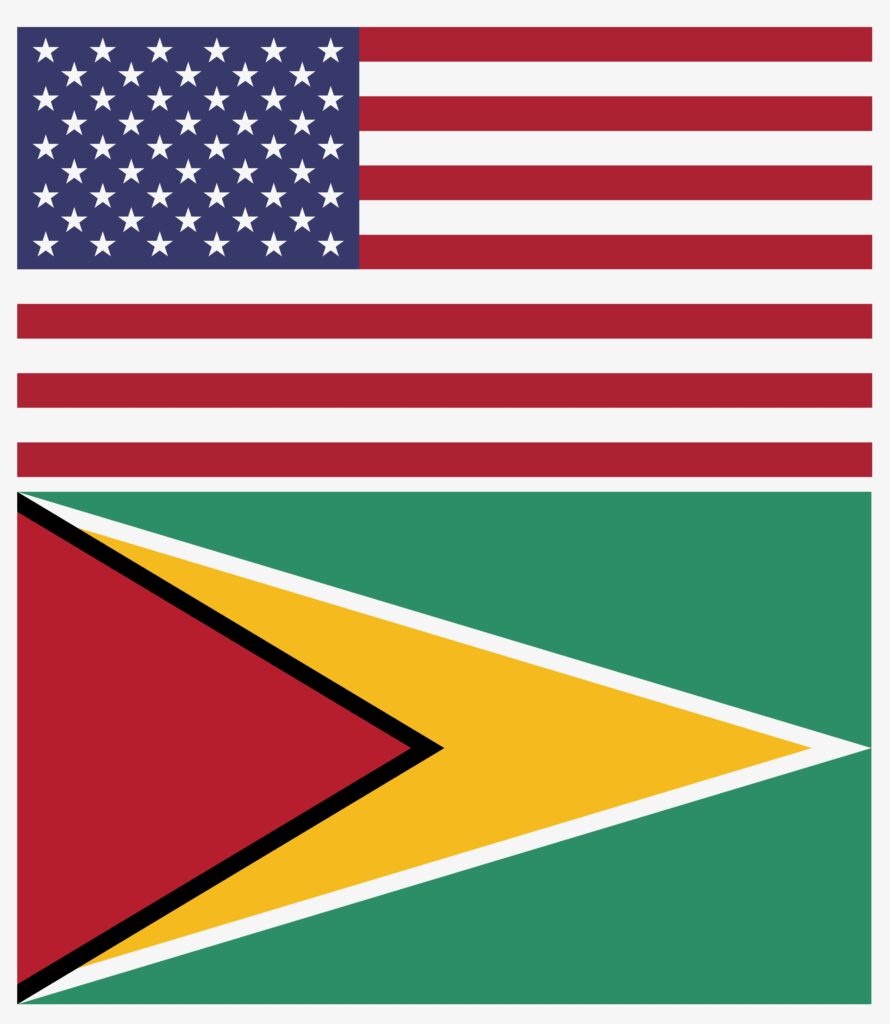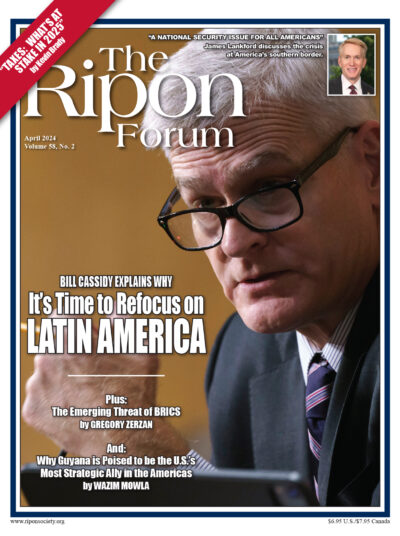
Guyana has been at the forefront of international headlines since ExxonMobil discovered significant offshore hydrocarbon resources in 2015. Since oil production began in 2019, Guyana has become one of the world’s fastest growing economies. In 2023 alone, Guyana’s economy grew by almost 40 percent. And 2024 will also see record-setting growth rates as the country becomes the world’s largest per capita producer of oil next year, reaching production levels close to 900,000 barrels per day.
Guyana’s global presence has, of course, drawn attention from the United States, with former and current Secretaries of State Mike Pompeo and Antony Blinken visiting the country over the past few years. What is clear is that Guyana is increasingly becoming a strategic outpost for U.S. interests across the Americas as the country cements its place as a regional leader. To remain so in the long term, U.S. policymakers and business leaders alike will need to make significant investments in the relationship with Guyana.
Guyana’s economic outlook has taken off. The cashflow from oil production has stimulated economic opportunity for Guyana with investors from all over the world traveling to the country, seeking opportunities in energy, agriculture, tourism, and infrastructure, among others. Guyana has invested heavily in its sugar and rice industries, encouraged private sector growth and involvement in development objectives, and is undergoing massive upskilling initiatives, all with the intent of ameliorating any potential pitfalls stemming from the resource boom.
Guyana is increasingly becoming a strategic outpost for U.S. interests across the Americas as the country cements its place as a regional leader.
Economic diversification has translated into a stronger U.S.-Guyana relationship since President Irfaan Ali was voted into office in 2020. The U.S. Embassy in Georgetown (Guyana’s capital) plays an influential role, increasingly seen as a trustworthy partner by the public and private sectors. U.S. companies, which have poured into Guyana, are often the first choice among the local private sector and the government for joint ventures. And the U.S. Southern Command is working closely with the Guyana Defense Force to improve defense capabilities and humanitarian assistance training post-natural disasters.
Despite a strengthened relationship, engagement from the United States has been ad hoc, at best. While the U.S. Embassy has built a foundation for the relationship, this has not yet resonated in Washington. Sure, there is excitement about Guyana by policymakers aware of its hydrocarbon reserves, but that has not instilled confidence that the United States sees the strategic value in consistently supporting Guyana’s development. Ad hoc engagements satisfy short-term demand for attention — especially for smaller countries routinely on the outskirts of U.S. foreign policy — but limited continuity and consistency opens gaps for other actors to engage with Guyana. This is not to say that Guyana is not a strong U.S. ally, which actively shows that it prefers U.S. engagement vis a vis any other globally. But naturally, a country with an increasingly attractive investment environment and market will bring new foreign actors to the table.

China is one example that tends to catch U.S. policymakers’ attention. The Chinese National Offshore Oil Company (CNOOC) owns a 25 percent stake in the ExxonMobil-led consortium operating Guyana’s Stabroek Block. And Guyana has worked with the Chinese private sector to finance large-scale infrastructure projects, from bridge expansions to new roads. However, these projects and this broader Chinese engagement are similar to that of the United States — one-off engagements and infrequent commitments, meaning that there has not been a better time for U.S. policymakers to consolidate its relations with Guyana for the long haul. China is a passive player in Guyana, and that likely will remain so over the next few years. Policymakers have a short window to capitalize on this moment, of course, with the understanding that Guyana’s engagement with the United States and China is never going to be zero-sum, instead a push-and-pull of negotiation with both partners.
Despite a strengthened relationship, engagement from the United States has been ad hoc, at best.
Because of its unique mix of oil and gas production and its strong contribution to the improvement of the environment, Guyana is one country in the Americas that should be able to draw bipartisan support for its economic development. Yes, on the one hand, Guyana’s oil and gas market is attractive to pro-industry U.S. policymakers. But on the other hand, Guyana has a global track record of being a leader in forest conservation, biodiversity, and protection of indigenous and Amerindian communities — all of which should satisfy pro-environment lobbies. Even at peak production, Guyana will remain a carbon sink, as its forest sequesters up to 150 million tons of emissions annually.
At the same time, Guyana is a gateway into two areas of the Americas. Guyana is considered “Caribbean” based on its language, culture, and historical connections to the region. The Caribbean Community’s Secretariat — the main and most prominent organization for the region’s island states — sits in Georgetown. But Guyana is also situated at the tip of South America, bordering Suriname, Venezuela, and Brazil. Therefore, for the United States, in terms of policy influence, trade and investment, and counter-narcotics and illegal operations, Guyana is geographically well-positioned to work with U.S. policymakers as a regional partner that can work towards a more secure and prosperous Western Hemisphere.
To capitalize on the relationship with Guyana, U.S. policymakers should establish a high-level economic and security dialogue with Guyana, similar to ones the United States has with countries like Mexico, Colombia, and Guatemala, among others. These dialogues facilitate routine conversations around shared interests. They also increase the depth of the relationship, moving beyond high-level diplomatic engagements, tending to incorporate actors across the business community, civil society, and subnational governments.
But engagement with Guyana cannot be partisan, which would inherently create discontinuity in the relationship. A bipartisan Congressional delegation should be encouraged to travel to Guyana, acting as a scoping mission for topics that can feed into a high-level dialogue and build lasting relationships with key political and economic influencers in the country.
If the United States is able to take a long-term, consistent approach to Guyana, it would cement what might become its most strategic ally in the Americas. Guyana will be trending upward for the foreseeable future and is only at the early stages of its growth. Now is the time for the U.S.-Guyana relationship to be set up for the long haul.
Wazim Mowla is the associate director and fellow of the Caribbean Initiative at the Atlantic Council’s Adrienne Arsht Latin America Center




